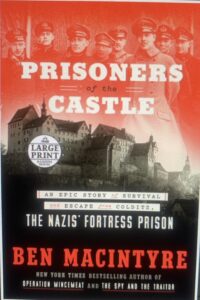Paul O’Connor starts the New Year off right with a review of a work of popular history that he says is as gripping as any fictional account. Maybe more…
Reviewed by Paul T. O’Connor
PRISONERS OF THE CASTLE: An Epic Story of Survival and Escape from Colditz, the Nazis’ Fortress Prison. By Ben Macintyre. Hardcover. Crown. 313 pages. $28.99. Also available in audiobook, read by the author. 13 hours, 25 minutes.
 Many years ago, a self-help column suggested we write out our most serious anxieties, put the pages in a bag, and store them away. Or something like that. It was a stupid idea then, and it was a stupid idea when the German Army, fresh off its blitzkrieg of victories early in World War II, took the same approach with its most intransigent prisoners of war.
Many years ago, a self-help column suggested we write out our most serious anxieties, put the pages in a bag, and store them away. Or something like that. It was a stupid idea then, and it was a stupid idea when the German Army, fresh off its blitzkrieg of victories early in World War II, took the same approach with its most intransigent prisoners of war.
Colditz Castle, near the city of Leipzig, was chosen as the POW camp of last resort for the most troublesome British, Polish, Dutch, French and Czech captives. The fortress was escape-proof, so the Wehrmacht thought, and putting all of the worst together, out of the way, meant they wouldn’t infect more docile POWs with any ideas of escape.
Colditz had a long history of imprisoning people who annoyed the local princes and an equally long record of successfully holding them inside. That record of success began to be tested almost immediately after British Capt. Pat Reid of the Royal Army Service Corps arrived on Nov. 10, 1940. Reid, like the hundreds of other prisoners who would be held at Colditz over the next 4 ½ years, was a troublemaker, determined to escape and return to the war.
In Prisoners of the Castle, acclaimed British popular historian Ben Macintyre has written another gripping read, his 15th. I’ve thoroughly enjoyed Agent Sonya, The Spy and the Traitor and Operation Mincemeat. His books read more like fictional combat or espionage novels because he is an excellent storyteller. (He even masters the job of narrating the audiobook version.)
The story of Colditz has been told many times. It is likely the best chronicled POW camp with the exception of Stalag Luft III, setting for The Great Escape, the story of the 76 allied airmen who tunneled their way to at least temporary freedom in March 1944. But Macintyre brings fresh information to the camp’s story, providing a more realistic look at POW life, including aspects of homosexuality and mental deterioration, than previous chroniclers.
This story is very different from that of Stalag Luft III, which centered on one amazing tunnel escape. (The movie contains much Hollywood fiction, by the way, for example, Steve McQueen’s motorcycle-riding character.) If anything, Macintyre’s Colditz looks more like Stalag 13, the fictional camp of the 1960s TV series, Hogan’s Heroes. The Germans of Colditz were no fools; there was no Col. Klink or Sgt. Schultz. But the ingenuity of the POWs, their ability to communicate with London and their establishment of an intelligence network of use to the Allied command were as awe-inspiring as the fictional machinations of Col. Hogan and his compatriots.
And the escape plans, both successful and not, are truly as entertaining as anything Bob Crane’s writers ever put on TV. The book’s opening scene, for one, tells of an escape attempt in which British officers pass themselves off as the German sergeant in charge of a security detail.
There are also the stories of a playboy Czech pilot who has an affair with a dental assistant in town, of an effort to build a glider that the prisoners will fly over the prison walls and of escapees who didn’t escape but merely hid in the prison hoping to make the Germans think they had escaped.
As they say, all’s fun until someone gets hurt, and that’s what begins to happen later in the war. Macintyre writes that the German army followed the Geneva Conventions with regard to POWs and escapees. But late in the war, as Axis defeat became obvious, the Nazi high command gave control to the SS. And that is where Macintyre builds the suspense. American ground forces are closing in on Colditz, but SS units are determined to grab the POWS and either carry them further into the Reich or murder them. It may be nonfiction, but it’s nail-biting nonetheless.